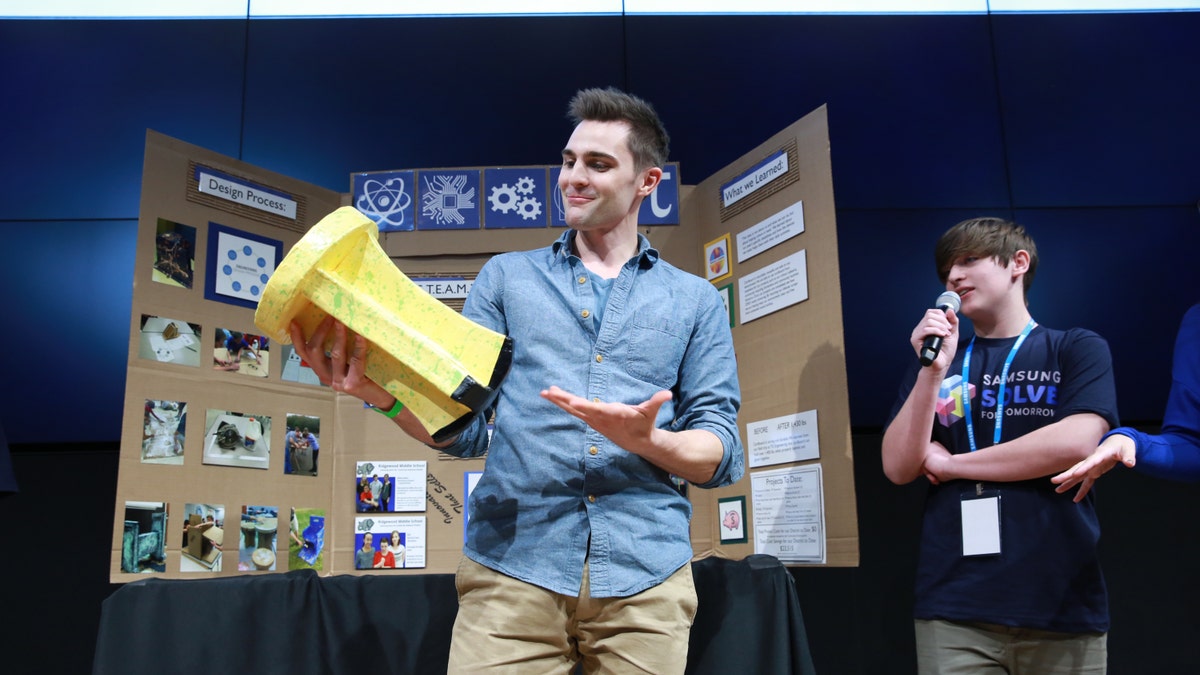
Nick Uhas judges the fifteen National Finalists projects and presentations during the Samsung Solve for Tomorrow Finalist Pitch Event on Tuesday, March 15, 2016 in New York.(Amy Sussman / AP Images for Samsung)
Science, technology, engineering and math – or STEM for short – are areas of education that are so vital to our daily life they cannot be ignored.
Science surrounds us in our natural world with the sun, moon, stars, weather and living creatures that inhabit the earth. Technology is forever improving our lives and is practically an extension of humans themselves with our love of smartphones, TVs and computers. Engineering is the path that creates all of these new devices while math is the foundation of organizing this critical information. STEM is so essential to our surrounding world because it is our surrounding world.
Needless to say STEM is important, but who is it the most important for? Experts agree that in the future, more and more jobs will require advanced STEM skills. And this is why there has been a national push to support STEM education for kids. From my experience being involved in STEM initiatives, including being a host on FabLab, I believe it is important to show kids that STEM goes beyond the classroom and workplace. It has the power to solve complex issues, when used by forward-thinking individuals.
The concept of using STEM to make a difference is at the core of the Samsung Solve for Tomorrow contest, which challenges public school students in grades 6 through 12 to use STEM to create a solution to a problem affecting their local community. The contest offers schools across the nation the opportunity to amplify their students’ excitement for STEM subjects. This year, more than 4,100 teams of teachers and students from across the country entered to vie for a piece of the $2 million in technology prizes. The teams tackled real-world issues with a style and sense of professionalism on par with that of a MIT-educated professional. One team created therapeutic devices for disabled students; another, smartwatch app for keeping pedestrians safe; and another, a solar-powered charging station for electric vehicles.
As a judge at the contest’s Pitch Event, I had the pleasure of watching the 15 national finalists present their projects live. The authentic yearning for solving local problems by these students from all walks of the U.S. was palpable with each unique presentation. I was beyond impressed with the detailed, focused and well-thought-out projects. I kept thinking in the back of my mind: Why don’t solutions like these already exist?
After pondering this question all day, I concluded that many adults are too caught up in their own day-to-day responsibilities to focus on and tackle issues highlighted in the Samsung Solve for Tomorrow competition. Sometimes it takes a young mind and fresh perspective to solve complex problems with simple solutions. The experience and realization only reinforced for me that STEM is the future and the answer.
This also reaffirmed for me why I agreed to host the new STEM-focused show FabLab, geared toward teens. I feel like my participation in communicating the importance of science, technology and innovation is crucial, not just because I personally love the subjects but also because I see the importance of sculpting educational priorities in the STEM fields. Helping students latch onto and master STEM subjects and realize the power of STEM can only benefit them in achieving bright futures and everyone in living in a better world.
To see the teams in action, head over to www.fablabtv.com, where you can enjoy the entire competition as I did in the front row of the main stage at Samsung 837 in New York City. Also, tune in to your local FOX station on weekend mornings to watch the latest episode of FabLab.
Nick Uhas hosts FabLab TV, which airs locally on FOX stations nationwide.
